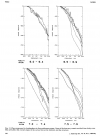So you are claiming to understand engineering but don’t know the definition of dB?Your DAC chip need output stage. You can't avoid capacitors at your RCA, XLR analog output. If you want one DAC, you can even trace the circuit. It is not just science, it is engineering.
1) phase shift is measurable , please show a measurement of a good measuring dac with significant phase shift in the audio band.
2) next ,please show some evidence that this phase shift is audible.


